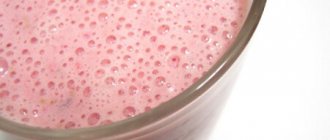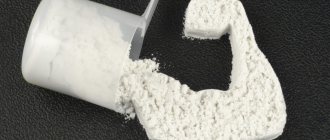Amino acid complexes are sports nutrition, where not individual types are present, but all amino acids. These supplements should not be confused with BCAA. Protein is also an amino acid, so the sports nutrition in question is practically no different from it. However, given the characteristics of each, they exist. What is the difference? What to give preference to?
Benefits of Amino Acids
The following advantages speak in favor of the use of complexes:
- Does not require digestion. Complexes are absorbed much faster than proteins. The latter first require preliminary breakdown into amino acids. The difference in the assimilation process is up to one hour. It may be longer or shorter. It all depends on the type of protein. This difference is not significant even for a training person, so this advantage cannot be called significant.
- Contain a minimal amount of carbohydrates and fats. Most of the complexes on sale contain virtually no impurities. Proteins contain about 5% fat and 10-15% carbohydrates. Amino acids are great for those who want to lose weight. There are proteins with a minimum amount of fats and carbohydrates that are not inferior to complexes in this aspect.
- Much more convenient to use. To take complexes you do not need to use a shaker, mix cocktails and then wash dishes. There is no need to purchase milk for preparation. The use of amino acids comes down to taking tablets with water.
The differences are not significant, but they are there.
Amino acids or protein. What's better.
Proteins or amino acids
Amino acids are complexes of amino acids. This complex contains all types of amino acids. Protein is protein. And protein is amino acids. So, protein and amino acids are quite similar to each other. But there are still some differences. Let's clarify the advantages of using amino acids and proteins.
What are amino acids? Why take them?
Amino acids are important components of protein. Amino acid complexes are needed for rapid recovery and growth of muscle tissue. Regular food cannot satisfy the body's need for all the necessary amino acids during sports. Each of the existing amino acids is needed by the body and performs its own specific function. Amino acid complexes contain all amino acids. Such complexes contain a very large number of essential amino acids that are not produced in our body.
You should always take amino acids. Regardless of whether the athlete is training or has temporarily stopped his activities. Because during training, the athlete builds up his muscle mass, and when he stops training, amino acids prevent the muscles from breaking down and keep them normal.
You need to take amino acid complexes in accordance with your body weight and divide the intake into 2 times a day.
Preparations of amino acid complexes are produced in the form of powder, capsules or tablets and in liquid form. The liquid form contains about 50% amino acids.
Benefits of Proteins
- Low cost proteins. The difference in the cost of proteins and amino acid complexes is quite noticeable. Proteins do not require additional processing. Moreover, it does not need to be made in the form of tablets or scattered into capsules.
- Quite a long process of protein breakdown. If you use casein, this protein will be broken down within 3-4 hours. During this time, the body will constantly receive amino acids that will help gain muscle mass or restore it.
- Protein supplements are suitable for both gaining muscle mass and losing weight. Proteins fill you up better and faster. During a diet, proteins can replace some foods and prevent muscle mass from decreasing. There is an increase in the amount of protein consumed, and carbohydrates and fats, on the contrary, decrease. When using amino acids, such saturation will not occur.
Benefits of amino acid complexes:
- Ease of use. If it is necessary to use amino acid complexes, the use of special dishes (shaker) and dairy products is not required. You can take a certain number of tablets and wash them down with water.
- Amino acid complexes do not require digestion. The rate of absorption of amino acids is much faster than that of proteins. This is due to the need to initially break down proteins to produce amino acids. The splitting process takes a little over an hour.
- Amino acids contain practically no carbohydrates and fat. A large number of amino acid complexes do not contain fat and carbohydrates. It follows from this that such complexes are more suitable for those who want to lose weight. But there are also proteins that do not contain large amounts of carbohydrates and fats.
Experts in this field claim that there will be no effect when using amino acid complexes and proteins simultaneously. It is recommended to choose one thing.
If the athlete's goal is to quickly gain muscle mass, then the best option would be to use proteins. Don’t forget that using protein will cost about 1.5 times less than amino acid complexes.
You should pay attention to the composition of the base of the complex. The quality of the purchased product depends on this. If the selected amino acid complex contains whey protein concentrate, then this is a simple protein compressed into tablets.
Natural amino acid complexes are necessarily produced from hydrolyzed proteins. Such complexes are very rarely found on sale and are much more expensive than all other amino acids. When choosing liquid amino acid complexes, you should also be very careful. Most of them contain gelatin hydrolyzate. And this component is mainly used to restore injured ligaments, and not to quickly gain muscle mass.
From all this it follows that it is better to use proteins than amino acid complexes.
Benefits of Proteins
The main advantages of protein over amino acids:
- Better feeling of fullness. This property allows you to reduce appetite and suppress hunger. Replacing some meals or parts of a meal with protein can increase the amount of protein and reduce the percentage of fats and carbohydrates. This makes proteins an ideal choice for weight loss. Amino acids are not suitable for these purposes. It is almost impossible to get enough of tablets and capsules.
- Certain types of protein take a long time to break down in the body. Casein is one of these proteins. This protein quality is a significant advantage in some situations. Proteins that break down over a long period of time can be taken at night. They will gradually saturate the body with amino acids, promoting the growth and restoration of muscle fibers. The complexes are quickly broken down, so they are absorbed into the blood within the first hour after administration.
- Greater availability. Amino acid complexes are more expensive than regular protein powder. The difference reaches one and a half times. A kilogram of inexpensive protein will cost about 1,000 rubles, and the most affordable complex will cost no less than 1,500 rubles.
The last point should be discussed in more detail. Cheapness is the main advantage of protein over complexes, but here a reasonable question arises: where does such a big difference come from if both types of sports nutrition are almost identical. The higher price is due to the fact that the tablets require pre-compression into tablets, scattering into capsules or adding to syrup.
What to choose: protein or amino acids?
Most novice athletes who are just starting to take sports nutrition products often have questions about protein and amino acids: what is the difference between them and which one is preferable to choose? Is it possible to combine them, and are they complementary?
Protein, in other words protein, performs many functions in the body: “building” and repairing tissue, acts as the main component in the immune system, is responsible for all the main functions of the body, namely reproductive, motor, nutrition-related functions and many others .
Protein consists of amino acids that are linked together by peptide bonds.
In order for the ingested protein to be absorbed, the body destroys all peptide bonds of amino acids, spending a lot of energy, and only then does the process of protein assimilation begin.
There are “fast” and “slow” proteins. For example, whey protein is classified as “fast”, it is absorbed by the body in a short time, but the supply of amino acids in this case is maintained at a certain level for no more than a couple of hours. This protein can be taken between meals or after training.
“Slow” proteins include casein, which supplies the body with amino acids for 8-12 hours, providing an anti-catabolic effect. This protein can and should be taken at night to combat catabolism.
Amyslots are protein derivatives. All sports nutrition manufacturers have long been producing amino acids in free form and calling them free amino acids.
Free amino acids are the result of complete hydrolysis (breakdown) of protein molecules. Amino acids begin to be absorbed into the blood directly in the stomach and enter the body tissues literally 10-15 minutes after administration. The body uses them for its own growth, restoration, strengthening and production of various hormones, antibodies and enzymes.
Taking amino acid complexes precisely after intense training is of great importance for the effective restoration of depleted muscle tissue. Amino acids accelerate the growth of muscle mass and strength. The absorption of free amino acids, unlike protein, does not require additional energy and does not inhibit the restoration of energy reserves in muscle cells.
So, let's draw a line on what is preferable...
Protein is an excellent natural product for gaining lean muscle mass. When comparing protein and amino acids, a serving of protein contains more protein than a serving of amino acids. Yes, protein takes a little longer to digest, but our muscles receive more nutrition. Therefore, protein should be taken in the morning after waking up (the period of activation of catabolism) and after training.
As for complex amino acids, they mainly work on the restoration of muscle fibers and contribute to a slight increase in muscle mass. Great for drying out athletes. And since amino acids are absorbed very quickly, they can be taken in the morning after waking up, within 20-30 minutes. before main meals and immediately after training.
Protein and amino acids can be combined, so these two products complement each other perfectly.
For example, on training days, take amino acids in the morning and after training, and protein between meals and before training (protein consumption is approximately 2 servings per day). On rest days - amino acids in the morning and evening and protein between meals (protein consumption is approximately 1-2 servings per day).
Many novice athletes who have not previously encountered sports nutrition products, but want to build up lean muscle mass, believe that 1-2 servings of protein per day for a month, 2-3 meals per day and 3 trips to the gym per week without any enthusiasm is enough... And, nevertheless, they are surprised that they never achieved the desired results.
It is important to know that protein and amino acids are not miracle products for gaining muscle mass, from which muscles grow by leaps and bounds. First of all, protein is an additional source of protein intake. And without a well-designed training and nutrition program, you shouldn’t expect magic from it.
The best proteins and amino acids
You should always select sports nutrition taking into account not only cost, but also quality. The following additives demonstrate a good relationship between these two criteria:
- Proteins . Mutant Whey with 61% protein, Syntrax Whey Snake and Syntrax Matrix with 77% protein, Maxler Whey Protein with 73% protein.
- Amino acid complexes . Scitec Nutrition: Amino 5600, Dymatize Super Amino 6000, Hardlabz Aminoz.
This is not a complete list of protein supplements. You can always look at various reviews and tops that describe a wide variety of complexes and proteins. When choosing a specific product, you can watch reviews and even videos that allow you to make your final choice.











